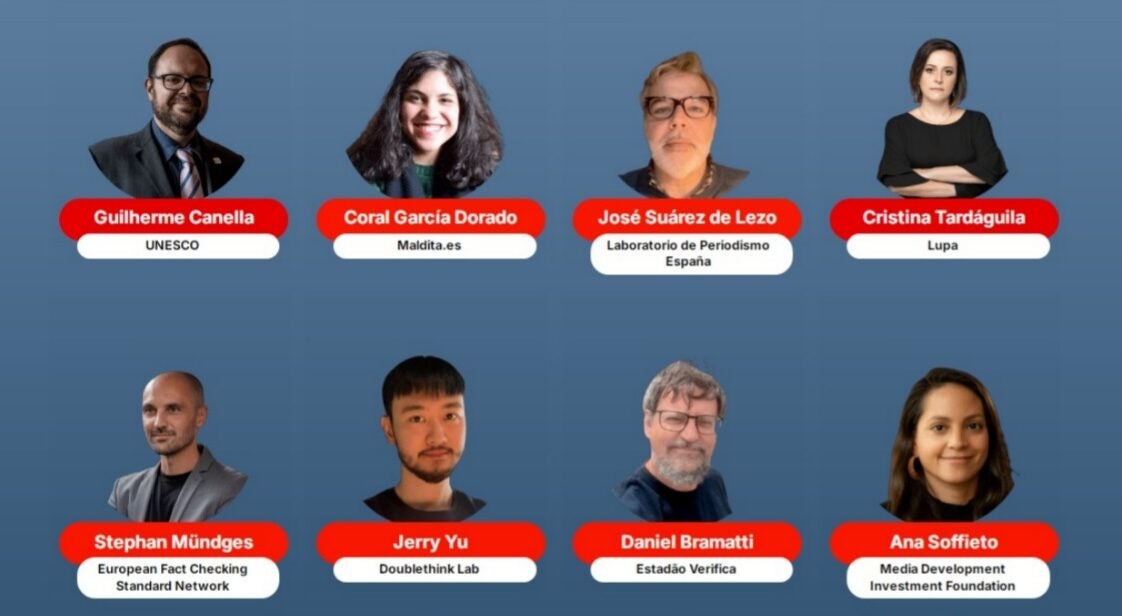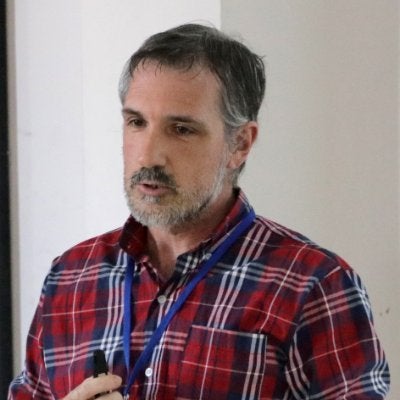Influence operations in wars through disinformation, the use of manipulated content to commit scams, and the inclusion of the Portuguese language and disinformation issues in Brazil are the main new features of the fifth edition of the Global Disinformation Summit.
The event, which will be held on Sept. 17 and 18, will be free and online. It will bring together journalists, researchers, tech professionals, educators, and organizations from around the world to discuss, propose, and take action against disinformation.
For the first time in its history, the summit will be trilingual, with simultaneous translation into Portuguese, in addition to English and Spanish. This is possible thanks to the incorporation of the Brazilian fact-checking platform Lupa as a strategic partner.

This year's edition of the Global Disinformation Summit features the participation of speakers from more than 40 countries of five continents. (Photo: Screenshot of the summit's website)
This collaboration is part of the celebrations for Lupa's tenth anniversary and will allow for a greater presence of panels focused on disinformation issues affecting Brazil, as well as a greater reach in terms of the summit’s audience, said Cristina Tardáguila, founder of Lupa and former deputy director of the International Fact-Checking Network (IFCN).
"Brazil is a huge country, with a lot of people, it is one of the main consumer markets for social networks, it is a market that currently has some type of leadership in what has to do with regulation, it is a market that has many examples of polarization and an advanced use of artificial intelligence," Tardáguila told LatAm Journalism Review (LJR). "So there's nothing to justify Brazil not having a space where it would have a predominance in the global discussions on disinformation."
Tardáguila said she anticipates the issue of disinformation in electoral periods will be featured in the panels that include Brazilian speakers, a little more than a year before that country’s presidential elections on Oct. 4, 2026.
The topic of disinformation in war conflicts is another new feature the fifth edition of the summit will offer, Tardáguila said. The event will have panels on Foreign Information Manipulation and Interference (FIMI), as actions by foreign actors that seek to influence public opinion in another country are known.
In contexts of war, FIMI can manifest in the form of spreading false or manipulated information to demoralize and divide the population, create confusion about what is happening on the battlefield, influence international public opinion and justify military actions, among other actions.
Tardáguila said the panels on FIMI will seek to explain the intersection between disinformation and influence operations and to teach the techniques to investigate the phenomenon.
"As journalists, we have to know that this exists, know what impact it has on our audiences and know how to write about it," Tardáguila said.
The use of disinformation to carry out online scams was one of the most alarming issues Lupa identified in the last year. For this reason, the media outlet chose to dedicate one of its panels to this phenomenon, Tardáguila said.
The panel will address the connection of disinformation with online scams and will present a study prepared by Lupa on the topic in the Brazilian context, she said, adding that among the speakers they hope to include a social media scams specialist and a representative from the Brazilian Attorney General's Office.
"We know that disinformation is used for politics. Then, in the pandemic, we realized that it also appears in health, and then we realized that there is disinformation in war," Tardáguila said. "But the great surprise is the impressively high use of disinformation in the economic, financial and data universe for scams."
¡Alcanzamos +1000 registrados! Gracias a todos los que ya son parte
September 17 and 18
Free and virtual
Trilingual¿Y tú? Inscríbete ahora https://t.co/Fo6dTAQEWA pic.twitter.com/raZRoNSFCo
— CumbreDesinfo (@cumbredesinfo) August 27, 2025
Tardáguila said that in another panel, she will present the Global Fact-Check Chatbot, a multilingual AI tool developed by IFCN members and allies. The chatbot will help fact-checkers around the world verify information with just a few clicks from their phone or computer.
"It will be based on all the fact checks published by fact-checkers," she said. "It will be a tool that will be available to fact-checkers at the beginning, but eventually to citizens, so that they can do their work more quickly and efficiently."
Looking ahead to future editions, it’s important to expand discussion and debate on disinformation, as it’s a phenomenon that affects democracy, according to Carlos Lauría, executive director of the Inter American Press Association (IAPA). The IAPA organizes the summit along with the Foundation for Journalism (Bolivia) and Proyecto Desconfío (Argentina).
Lauría told LJR that it is essential to continue coordinating efforts among summit organizers to be proactive in designing best practices and collective solutions of global impact, as well as to involve academics and technology professionals.
"It is important to have a wide network of strategic allies who have a focus on concrete and, above all, collaborative actions," Lauría said.
This year's edition features the participation of speakers from more than 40 countries on five continents, said Adrián Pino, founder of Proyecto Desconfío.
"This year we are excited that projects linked to Africa, where there was usually a little less participation, have been added, and of course from Latin America, Europe, the United States, and Asia, which will also have representation at this year's summit," Pino told LJR.
For this edition, the audience was asked for proposals on topics for possible panels, whose curation was in charge of Lupa. The media outlet received more than 200 suggestions from more than 70 countries, among which topics such as AI, media literacy and the use of disinformation as a tool of war were frequent, Tardáguila said.
The disruption of AI continues to be one of the most important challenges for journalists and fact-checkers in terms of disinformation, Lauría said.
With several countries in the region holding elections in the coming months, AI-driven disinformation once again becomes a focus of attention, he added.
"Deepfakes, manipulated videos and audio are becoming increasingly realistic and difficult to detect, even for users with technical knowledge," Lauría said. "And that obviously represents a growing threat to electoral integrity."

Adrián Pino, Proyecto Desconfío director, said that the summit will announce this year a special fund to encourage research on disinformation. (Photo: Courtesy Cumbre Global sobre Desinformación)
Verification efforts in Latin America continue to face significant limitations that make them insufficient, Lauría added.
"I believe that [verification efforts] cover less than half of the false narratives, and sometimes they arrive late," he said. "They rarely reach conversations between different communities with different ideologies, among other limitations that can influence the process."
Another factor that has hindered the fight against disinformation in the last year is the decision of Facebook and X to abandon their information verification initiatives, Lauría said.
"It is an ingredient that adds a degree of complexity to an already very complicated issue, in a public discourse that is extremely corrupted and contaminated by lies and disinformation," he said. "It has been proven that [disinformation] circulates much faster than facts. So this decision by some technology companies is a significant step backward."
Given these challenges and the rapid advance of disinformation, the summit will announce this year the creation of a special fund to encourage research on disinformation, said Pino, who added that the organizers are in the stage of forging alliances with actors interested in supporting said fund.
"We detected that there are many projects that have the potential to scale, but that do not have sufficient resources for their research to scale to other countries and other levels," he said. "That is the idea, to set up a fund that promotes research on disinformation and that, although its initial focus is on Latin America, it will be a global fund."
*The Knight Center for Journalism in the Americas is a media partner of the Global Disinformation Summit